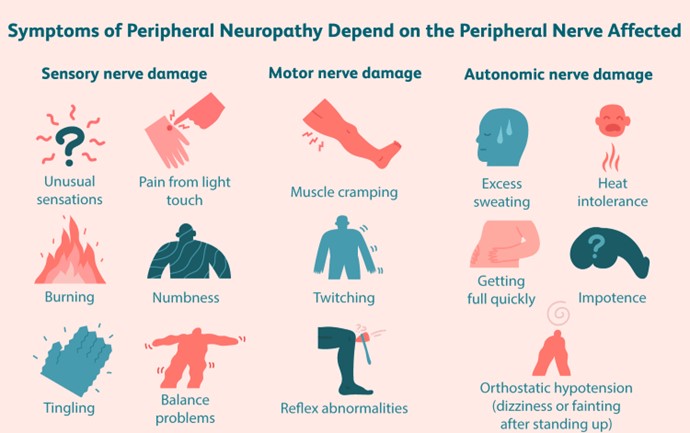A nurse is reinforcing teaching about preventing long-term complications of retinopathy and neuropathy with an older adult client who has diabetes mellitus. Which of the following actions is the most important for the nurse to include in the teaching?
“Wear closed-toed shoes daily.”
“Maintain stable blood glucose levels.”
“Plan to have an eye examination once per year.”
“Examine your feet carefully every day.”
The Correct Answer is B
Choice A reason: Wearing closed-toed shoes daily is a good practice for people with diabetes, as it can protect the feet from injuries and infections. However, it is not the most important action for preventing long-term complications of retinopathy and neuropathy. These complications are mainly caused by high blood glucose levels that damage the blood vessels and nerves in the eyes and feet.
Choice B reason: Maintaining stable blood glucose levels is the most important action for preventing long-term complications of retinopathy and neuropathy. High blood glucose levels can cause oxidative stress, inflammation, and endothelial dysfunction, which impair the blood flow and oxygen delivery to the eyes and feet. This can lead to nerve damage (neuropathy) and vision loss (retinopathy) over time. Keeping blood glucose levels within the target range can reduce the risk of these complications and slow down their progression if they already exist.
Choice C reason: Planning to have an eye examination once per year is a recommended action for people with diabetes, as it can help detect and treat retinopathy before it causes irreversible damage to the retina. However, it is not the most important action for preventing long-term complications of retinopathy and neuropathy. Eye examinations cannot prevent retinopathy from occurring or worsening; they can only monitor its status and provide appropriate interventions.
Choice D reason: Examining your feet carefully every day is another recommended action for people with diabetes, as it can help identify and treat any signs of neuropathy, such as numbness, tingling, pain, or ulcers. However, it is not the most important action for preventing long-term complications of retinopathy and neuropathy. Foot examinations cannot prevent neuropathy from occurring or worsening; they can only monitor its status and provide appropriate care.

Nursing Test Bank
Naxlex Comprehensive Predictor Exams
Related Questions
Correct Answer is D
Explanation
Choice A reason: Insulin injected into the thigh is not the most rapidly absorbed. The abdomen is the preferred site for insulin injection, as it has the fastest and most consistent absorption rate. The thigh, arm, and butock have slower and more variable absorption rates12.
Choice B reason: The botle of insulin should not be shaken before withdrawing the medication. Shaking can damage the insulin molecules and affect their potency and effectiveness. Instead, the botle should be gently rolled between the palms to mix the insulin evenly13.
Choice C reason: Lantus insulin should not be used immediately before each meal. Lantus is a long-acting insulin that provides a steady basal level of insulin for 24 hours. It should be taken once a day at the same time every day, regardless of meals. Humalog is a rapid-acting insulin that can be used immediately before each meal to cover the postprandial glucose spikes14.
Choice D reason: Unopened vials of insulin should be kept in the refrigerator until needed. This can help preserve their quality and potency until their expiration date. Opened vials of insulin can be kept at room temperature for up to 28 days, depending on the type and brand
Correct Answer is ["A","B","C"]
Explanation
Choice A reason: Tachycardia is a common symptom of hypoglycemia, as the body releases adrenaline and other hormones to raise the blood sugar level. This can cause the heart to beat faster and stronger.
Choice B reason: Blurry vision is a common symptom of hypoglycemia, as low blood sugar can affect the ability of the eyes to focus and see clearly. This can also cause headaches, dizziness, or double vision.
Choice C reason: Sweating is a common symptom of hypoglycemia, as the body tries to cool down and cope with the stress of low blood sugar. This can also cause shakiness, trembling, or tingling in the lips, tongue, or cheek.
Choice D reason: Polydipsia (excessive thirst) is not a symptom of hypoglycemia, but a symptom of hyperglycemia (high blood sugar). High blood sugar can cause dehydration and dry mouth, which make the person feel thirsty.
Choice E reason: Polyuria (excessive urination) is not a symptom of hypoglycemia, but a symptom of hyperglycemia (high blood sugar). High blood sugar can cause the kidneys to filter out excess glucose and water from the blood, which make the person urinate more often.
Whether you are a student looking to ace your exams or a practicing nurse seeking to enhance your expertise , our nursing education contents will empower you with the confidence and competence to make a difference in the lives of patients and become a respected leader in the healthcare field.
Visit Naxlex, invest in your future and unlock endless possibilities with our unparalleled nursing education contents today
Report Wrong Answer on the Current Question
Do you disagree with the answer? If yes, what is your expected answer? Explain.
Kindly be descriptive with the issue you are facing.
